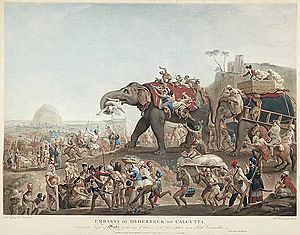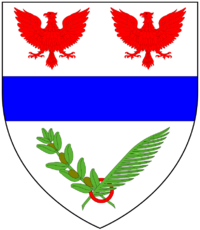Sir John Kennaway, 1st Baronet facts for kids
Sir John Kennaway, 1st Baronet (born March 6, 1758 – died January 1, 1836) was an important British soldier and diplomat. He lived at Escot House in Devon, England.
Early Life and Career
John Kennaway finished Exeter Grammar School in 1772. After school, he joined the East India Company's army as a cadet. He got this opportunity thanks to his mother's relative, Robert Palk.
Kennaway served in the Carnatic region of India. In 1781, he marched south with a military group from Bengal. He also took part in the Second Anglo-Mysore War.
Diplomatic Role in India
Later, Kennaway became the British representative, called a "Resident," at the court of Nizam Ali Khan, Asaf Jah II, who was the ruler of Hyderabad. In September 1788, he helped arrange the transfer of the Northern Circars region from Hyderabad to the Presidency of Madras, which was a British-controlled area.
In 1790, Kennaway played a key role in creating an alliance between the Nizam and the East India Company. This alliance was formed to go against Tipu Sultan, another powerful ruler in India. Because of his success in these negotiations, Kennaway was given the title of baronet in 1791. He was known as the Baronet "of Hyderabad". He also helped sign a peace treaty with Tipu Sultan in 1792.
Return to England
In 1794, Sir John Kennaway returned to England. He bought Escot House in Ottery St Mary, which became his family home.
Family Life
Sir John Kennaway married Charlotte Amyatt. They had many children, including seven sons and five daughters.
Their eldest son, also named Sir John Kennaway, became the 2nd Baronet after his father. He married Emily Frances Kingscote in 1831. He was known for his strong Christian beliefs.
Among their daughters, Charlotte Eliza married George Templer, and Maria married Francis William Newman. Another daughter, Frances, married Edward Cronin in 1838. Susan married Gerard Thomas Noel.
Their second son, Charles Edward Kennaway, became a cleric. He married Emma, and later Olivia. Two other sons, Laurence and William Richard, worked for the British government in Bengal.
 | Frances Mary Albrier |
 | Whitney Young |
 | Muhammad Ali |



